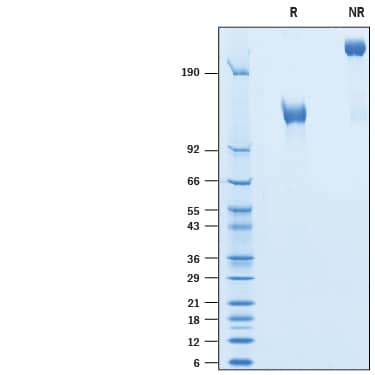Recombinant Cynomolgus Monkey EGFR Fc Chimera Protein, CF
R&D Systems, part of Bio-Techne | Catalog # 10366-ER

Key Product Details
Source
CHO
Accession #
Structure / Form
Disulfide-linked homodimer
Conjugate
Unconjugated
Applications
Bioactivity
Product Specifications
Source
Chinese Hamster Ovary cell line, CHO-derived cynomolgus monkey EGFR protein
| Cynomolgus Monkey EGFR (Leu25-Ser645) Accession # XP_005549616.1 |
IEGRMD | Human IgG1 (Pro100-Lys330) |
| N-terminus | C-terminus |
Purity
>95%, by SDS-PAGE visualized with Silver Staining and quantitative densitometry by Coomassie® Blue Staining.
Endotoxin Level
<0.10 EU per 1 μg of the protein by the LAL method.
N-terminal Sequence Analysis
Leu25
Predicted Molecular Mass
95 kDa
SDS-PAGE
110-130 kDa, under reducing conditions
Activity
Measured by its binding ability in a functional ELISA.
When Recombinant Cynomolgus Monkey EGFR Fc Chimera (Catalog # 10366-ER) is immobilized at 2 μg/mL (100 μL/well), the concentration of Biotinylated Recombinant Human EGF that produces 50% of the optimal binding response is found to be approximately 4-20 ng/mL.
When Recombinant Cynomolgus Monkey EGFR Fc Chimera (Catalog # 10366-ER) is immobilized at 2 μg/mL (100 μL/well), the concentration of Biotinylated Recombinant Human EGF that produces 50% of the optimal binding response is found to be approximately 4-20 ng/mL.
Scientific Data Images for Recombinant Cynomolgus Monkey EGFR Fc Chimera Protein, CF
Recombinant Cynomolgus Monkey EGFR Fc Chimera Protein Binding Activity
When Recombinant Cynomolgus Monkey EGFR Fc Chimera (Catalog # 10366-ER) is immobilized at 2 μg/mL (100 μL/well), the concentration of Biotinylated Recombinant Human EGF that produces 50% of the optimal binding response is found to be approximately 4-20 ng/mL.Recombinant Cynomolgus Monkey EGFR Fc Chimera Protein SDS-PAGE
2 μg/lane of Recombinant Cynomolgus Monkey EGFR Fc Chimera (Catalog # 10366-ER) was resolved with SDS-PAGE under reducing (R) and non-reducing (NR) conditions and visualized by Coomassie® Blue staining, showing bands at 110-130 kDa and 220-260 kDa, respectively.Formulation, Preparation and Storage
10366-ER
| Formulation | Lyophilized from a 0.2 μm filtered solution in PBS with Trehalose. |
| Reconstitution | Reconstitute at 200 μg/mL in PBS. |
| Shipping | The product is shipped at ambient temperature. Upon receipt, store it immediately at the temperature recommended below. |
| Stability & Storage | Use a manual defrost freezer and avoid repeated freeze-thaw cycles.
|
Background: EGFR
References
- Singh, A.B. and R.C. Harris (2005) Cell. Signal. 17:1183.
- Shilo, B.Z. (2005) Development 132:4017.
- Guillaudeau, A. et al. (2012) PLoS One. 7:1.
- Reiter J.L. et al. (2001) Genomics 71:1.
- Freed, D.M. et al. (2017) Cell. 171:683.
- Burgess, A.W. et al. (2003) Mol. Cell 12:541.
- Faria, J.A. et al. (2016) BBRC. 478:39.
- Lee, C.K. et al. (2017) J. Thoracic Oncology. 12:403.
Long Name
Epidermal Growth Factor Receptor
Alternate Names
EGF R, ErbB, ErbB1, HER-1
Gene Symbol
EGFR
UniProt
Additional EGFR Products
Product Documents for Recombinant Cynomolgus Monkey EGFR Fc Chimera Protein, CF
Product Specific Notices for Recombinant Cynomolgus Monkey EGFR Fc Chimera Protein, CF
For research use only
